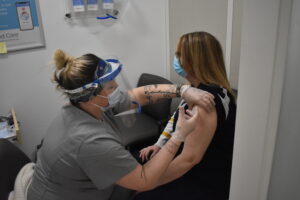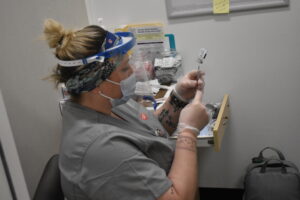Gage Johnson
Editor-in-Chief
gjohnson17@murraystate.edu
Kentucky entered into Phase 1C on Monday, March 1, which allowed all Murray State faculty and staff who want to get the COVID-19 vaccine the opportunity to roll up their sleeves.
It couldn’t come soon enough for Stephanie Anderson, assistant professor of journalism and mass communications and faculty adviser for The News.
“I was hoping that postsecondary educators would fall into the 1B phase as K-12 teachers did but that wasn’t the case,” Anderson said. “I have not seen my family but once in the last year and my 15-month-old son is missing out on those precious moments with his grandparents, aunts, uncles and cousins.”
Anderson said she was able to make an appointment for her first dose of the Moderna vaccine on the Walgreens website on Sunday, Feb. 28.
“It allowed me to go ahead and schedule for Wednesday, March 3 to get my vaccine even though 1C didn’t officially open until the next day,” Anderson said.
She said she signed up on the Calloway County Health Department’s website to be notified when she could schedule an appointment at the regional vaccination site at the CFSB Center. However, Walgreens allowed her to make an appointment sooner.
“I was going to seize any opportunity I could to get the vaccine,” Anderson said.

Anderson is one of the 845,695 people in Kentucky who have received the first dose of the vaccine, according to the Kentucky COVID-19 website.
Gov. Andy Beshear encouraged everyone, in his daily press briefing on Tuesday, March 2, to visit vaccine.ky.gov and sign up for notifications regarding vaccines.
“Not only will our website tell you which phase you are in specifically, you can supply your contact information so we can communicate with you when appointments become available at new and existing sites across the state,” Beshear said.
One of those regional vaccination sites, the CFSB Center, opened again on Wednesday, March 3.
Robert Jost, a non-traditional student who returned to school at the age of 71, got the vaccination at the CFSB Center on Feb. 21. He said the process of receiving his first dose of the vaccine was smooth and professional.
“Although there may be only about 500 over 70 in 1B in Calloway County, keep in mind that MSU is a regional vaccination center, so there were a lot of folks there,” Jost said. “I would say about 7 percent to 10 percent needed assistance as they were using walkers and wheelchairs, canes or crutches. This is where the nursing program students really showed their colors, their Racer spirit, in the way they assisted those that needed help, with courtesy, decency, respect and always a smile. Give a shout out to the Murray State public safety folks for the same attitude and approach.”
Ann Landini, a retired professor who spent 27 years with the University, fell into the 1B phase and was more than pleased to be able to get her first dose of the Moderna vaccine.
“I am very happy to be in one of the early phases,” Landini said. “I have been ready to receive my vaccination since November when the FDA began authorizing emergency use of Pfizer and Moderna vaccines. Our governor and state health director have done a remarkable job of working with the CDC guidelines to develop the process which will work best in our state. It seems an orderly and thoughtful way of getting vaccines to people as the supply of vaccines increases. Murray now has at least five different places where one can be vaccinated.”
Similar to Anderson, Landini said she wishes current faculty and staff had been included in the 1B phase with elementary and secondary school teachers, but is hoping that they can all get vaccinated quickly now that 1C can also be vaccinated.
While the majority of students have not yet been vaccinated, Amy Krazl, junior nursing major, said everyone, including students, should jump at the chance to get the vaccine.
Krazl received the first dose on Jan. 8 and the second dose on Feb. 5, both from Murray-Calloway County Hospital.
“Receiving the vaccine was an almost automatic choice for me,” Krazl said. “I am able to better protect others and myself, play a part in stopping the spread of COVID-19 and help the nation get closer to beating this virus. Despite all of the potential health concerns of which studies have not been done yet, I decided to trust the majority of the medical community in their trust of and satisfaction with the safety of the vaccine.”
Krazl said she only experienced soreness after the first vaccination but had a more significant reaction after the second dose. After about 10 hours, Krazl said it felt like she had the flu, experiencing body aches, chills and fatigue, but the symptoms almost completely subsided when she woke up the next morning.
Despite her reactions to the second dose, Krazl thinks everyone should get the vaccine.

“I most definitely believe others should get the vaccine,” Krazl said. “The temporary reaction to the vaccine is a simple setback in comparison to this incredibly crucial action that I believe everyone should take. We are one step closer as a nation and a world to stopping this pandemic. I encourage you to read trustworthy and credible sources from medical professionals regarding the vaccine. We don’t know everything, but the information we do have is so encouraging. Get educated and then get out there for your shot.”
Chris Trzepacz, assistant professor in the department of biological science and college head of Lee Clark Residential College, said when he received the vaccination the setup was very safe and went smoothly.
Trzepacz technically falls under the 1C group, but because of his daily interaction with students and others as a college head he was listed under the 1B group. Trzepacz said everyone had a scheduled time to receive the vaccine, and when he arrived he filled out some paperwork in a socially distanced waiting area.
“The vaccination itself was easy, and it was perhaps the least painful vaccination I can remember receiving,” Trzepacz said. “After the jab, they handed me my vaccination card and I was asked to hang around for 15 minutes so they could monitor me for any allergic reactions. I had none. By the next day, my shoulder was pretty sore, and it ached to move it above my head. But that discomfort was gone within 24 hours or so.”
Trzepacz said his experience getting the second dose was different since the health department was performing mass vaccinations and everything scaled up. The process was much quicker with stations, and it felt almost like an assembly line, Trzepacz said.
“About 6-8 hours after the second dose I started getting sore, which was an earlier onset than the first dose,” Trzepacz said. “The soreness continued into the next day, but I also had some additional symptoms, fatigue and a little light-headedness. This passed by the afternoon though – I think my post-lunch nap helped a great deal. The soreness disappeared in about 24 hours as before. While everyone’s experience will be different, I would recommend that everyone should plan to take the day off after their second dose.”
Trzepacz said he received the vaccine for several reasons, the first being to benefit the health of those around him. He said although the likelihood of surviving the virus is high even for his age group, he doesn’t want to take chances, nor does he want to run the risk of possible long-term effects.
“I also got the vaccine because it helps protect others,” Trzepacz said. “The original clinical trials indicated that the vaccine protects an individual from developing COVID-19, not necessarily from getting infected. But as they continue to study vaccinated populations it seems clear that vaccinated individuals are less likely to pass the virus to others, which means that the more people that are vaccinated, the better we will be as a community.”
Director of Communication Shawn Touney said approximately 1,100 people were vaccinated at the CFSB Center on Wednesday, March 3.
“We know many MSU faculty and staff were vaccinated throughout the day; however only the Health Department has those official records and they are not shared with Murray State,” Touney said.
Tourney said there will be a number of regional vaccination sites in March that will be announced by the Calloway County Health Department. For more information on how to sign up for a vaccine appointment, visit callowayhealth.org or vaccine.ky.gov.